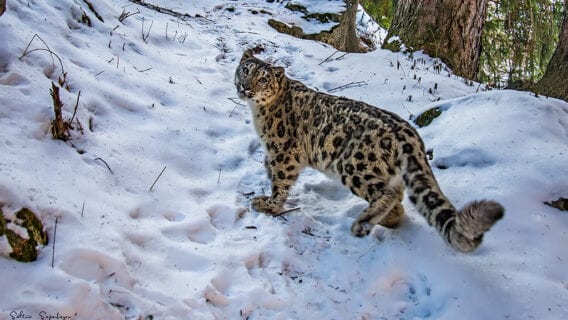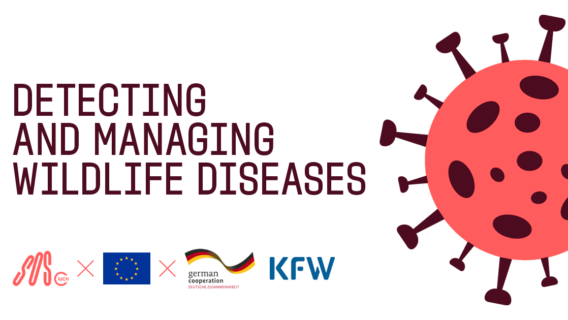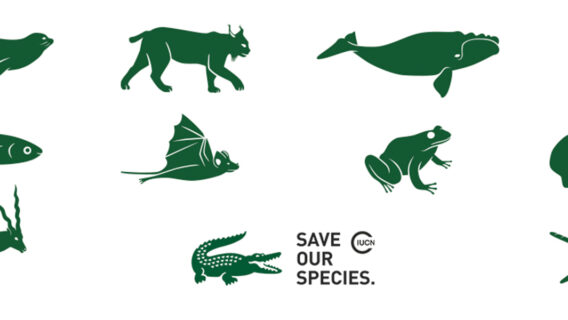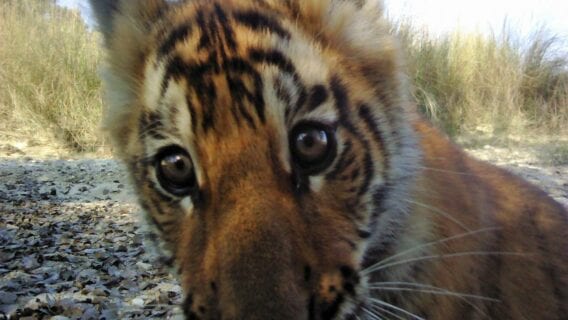Watch our webinar on our rapid action grants that supported wildlife conservation emergencies in Africa

Watch the webinar in English:
Regardez le webinar en français:
Africa’s vast landscapes, teeming with a quarter of the world’s species, are some of the most biodiverse regions on the planet. Yet, they are also among the most vulnerable. From the majestic lions of the savannah to the elusive Ethiopian wolf, Africa’s wildlife faces mounting threats from habitat loss, poaching, human-wildlife conflict, and the ever-looming impacts of climate change. These challenges, already formidable, were further intensified by the global COVID-19 pandemic, which disrupted conservation efforts, weakened environmental protections, and strained the very organizations dedicated to preserving these irreplaceable natural treasures.
Rapid response to conservation emergencies: Strategies, challenges and successes
Took place Wednesday, 21 August 2024 via Zoom
14:00 – 15:40 CEST
This webinar was conducted in English, simultaneously translated into French
In response to these urgent threats, IUCN Save Our Species in collaboration with the EU Directorate General of International Partnerships (DG INTPA), launched a series of rapid action grants under the SOS African Wildlife initiative. Running from 2019 to 2024, these grants have provided crucial support to frontline conservationists, empowering them to safeguard endangered species and protect their habitats through innovative, on-the-ground interventions.
Our webinar showcased the remarkable achievements of the rapid action grants and share invaluable lessons learned from this ambitious initiative.

The new SOS African Wildlife impact report provides an in-depth look at rapid action conservation efforts, highlighting detailed case studies and insights from the field.
Participants can gain insights into a broad spectrum of conservation actions that have been implemented to protect species, habitats, and communities in times of crisis. The event also offered strategic advice on how to quickly and effectively address conservation emergencies.
The fight for Africa’s wildlife is far from over, but the successes achieved under the SOS African Wildlife initiative offer hope and a blueprint for future efforts. Don’t miss this opportunity to learn, share, and contribute to the cause.
Agenda
- Host:
Dr Hans Bauer, Research Fellow, Lion Conservation in West, Central and Horn of Africa WILDCRU, University of Oxford
- Introduction:
Ana Nieto, Global Head, Species Conservation Action Team, International Union for Conservation of Nature (IUCN)
- Keynote address:
Nadia Cannata, Policy Officer, European Commission – Directorate General for International Partnerships
- Overview of the African Wildlife initiative:
Anne Mugo, Grants Coordinator, Species Conservation Action Team, International Union for Conservation of Nature (IUCN)
- Presentations:
“Emergency action to address COVID-19-related threats to the survival of mountain gorillas in Bwindi Impenetrable National Park”
Dr Gladys Kalema-Zikusoka, Founder/CEO, Conservation Through Public Health
“Buffering South Africa’s unique succulent species from the impacts of the illegal wildlife trade”
Matthew Norval, Chief Operations Officer, Wilderness Foundation Africa
“Emergency control of Salvinia molesta aquatic fern to save the African Manatee’s habitat and Lake Ossa’s biodiversity”
Dr Aristide Takoukam Kamla, Founder, African Marine Mammal
Conservation Organization
Panel discussion and Q&A
Meet the speakers

Dr Hans Bauer, WILDCRU, University of Oxford
Hans Bauer is a scientist with three decades of experience in lion conservation, particularly across West, Central and the Horn of Africa. He has written many landmark publications, including the IUCN Red List Assessment for the Lion. Working for the University of Oxford but resident in the region, he has a focus on human-lion conflict, local capacity strengthening and surveys of remote and wild places. www.wildcru.org

Nadia Cannata, Policy Officer, EU DGINTPA
Nadia Cannata is currently working as policy officer in the Unit in charge of environment and sustainable natural resources in the Directorate General International Partnerships, at the European Commission. She previously worked in the EU Delegations in Uganda, Nigeria, Sri Lanka and Niger.

Dr Gladys Kalema-Zikusoka, Conservation Through Public Health
Dr. Gladys Kalema-Zikusoka is Founder and CEO of Conservation Through Public Health (CTPH), an award-winning NGO and non-profit that protects endangered gorillas and other wildlife through One Health approaches. After graduating with a Bachelor in Veterinary Medicine from the Royal Veterinary College, University of London in 1995, she established Uganda Wildlife Authority’s first veterinary department in 1996. In 2000, she enrolled in a Zoological Medicine Residency and Master in Specialized Veterinary Medicine at North Carolina Zoological Park and North Carolina State University, where masters research on disease at the human/wildlife/livestock interface led her to found CTPH in 2003. In 2003, she also completed a certificate in non-profit management at Duke University. In 2015, she founded Gorilla Conservation Coffee to support farmers living around habitats where gorillas are found. CTPH’s most recent award is the 2020 Saint Andrews Prize for the Environment.

Anne Mugo, Grants Coordinator, Species Conservation Action Team, International Union for Conservation of Nature (IUCN)
A Natural Resource Management professional with an international track record of managing programs and projects at different scales, working with International Organisations, governments, national organisations, and other partners. Extensive field experience spanning over 15 years supporting the execution of projects that are knowledge-driven and innovative and based on effective communication and improved efficiency and realization of goals.
Worked at national organisation, International Organisations and private sector on a range of issues including Community Based Natural Resource Management, endangered species conservation, landscape conservation approaches, biodiversity conservation planning, policy mainstreaming, among others. Areas of expertise include project design and development, Portfolio/Programme Management, Grant Management, Capability Building, Project Monitoring and Evaluation, Resource Mobilization, Knowledge Management, Impact reporting, Stakeholder Engagement.
Is currently, a Grant Coordinator for Species Conservation Action at IUCN in Switzerland, ensuring that the Species Conservation Action portfolio contributes to delivering action on the ground to priority species in line with globally agreed strategies and policies.

Ana Nieto, Global Head, Species Conservation Action Team, International Union for Conservation of Nature (IUCN)
Ana Nieto has programme, project management, and managerial skills acquired during her more than eighteen years of professional experience working for international non-for profit organisations. At IUCN, Ana leads the Species Conservation Action Team, being responsible for the overall management of the two IUCN species grant-making facilities, IUCN Save Our Species and the Integrated Tiger Habitat Conservation Programme. Previously, Ana worked at the IUCN Regional Office for Europe, ECNC-European Centre for Nature Conservation (the Netherlands), EUCC–The Coastal Union and did some consultancy work for the European Environment Agency). Ana holds a Master Degree in Environmental Science/Environmental Management.

Matthew Norval, Wilderness Foundation Africa
Matthew is the Chief Operations Officer: Conservation at Wilderness Foundation Africa and has worked in private and state-owned protected areas across southern Africa over the last 35 years. He has been involved in the establishment, expansion and management of several prominent conservation areas in South Africa including the Namaqua National Park (Founding Park Manager), Baviaanskloof Mega-reserve, Plains of Camdeboo Private Reserve, the Mountain Zebra/Camdeboo Corridor Protected Environment and the Tanqua/Cederberg Wilderness Corridor. He and his team continue to work in expanding protected areas in the Succulent Karoo and the adjoining arid landscapes of South Africa as well as devising strategies and responses to the emerging succulent plant poaching crisis. Matthew also leads Wilderness Foundation Africa’s initiatives to protect rhino, expand their range and reduce demand for rhino horn with a decade long campaign in Vietnam.

Dr Aristide Takoukam Kamla, African Marine Mammal
Conservation Organization
Aristide Takoukam Kamla is a National Geographic Explorer, 2024 Whitley Award Winner, marine researcher, and conservationist. Since 2008, Kamla has worked on the conservation of the African manatee and other large aquatic wildlife in Cameroon, his native country. In 2011, he completed a master’s degree in animal biology at the University of Dschang in Cameroon. In 2014, he founded the African Marine Mammal Conservation Organization, a nonprofit organization dedicated to the protection of aquatic species. To address the knowledge gap for aquatic species in Cameroon, that year he established a small fisher sighting network and built a mobile app called SIREN to facilitate data collection and sharing by volunteer fishers. In December 2019, Kamla obtained a doctoral degree in veterinary medical sciences from the University of Florida. He initiated the first biological control approach to restore the African manatee habitat in Lake Ossa from the proliferation of the invasive plant species Salvinia molesta.
The African Wildlife initiative is supported by IUCN Save Our Species and co-funded by the European Union.




